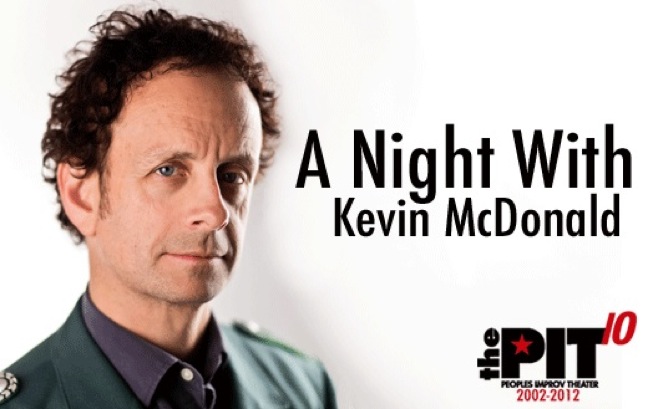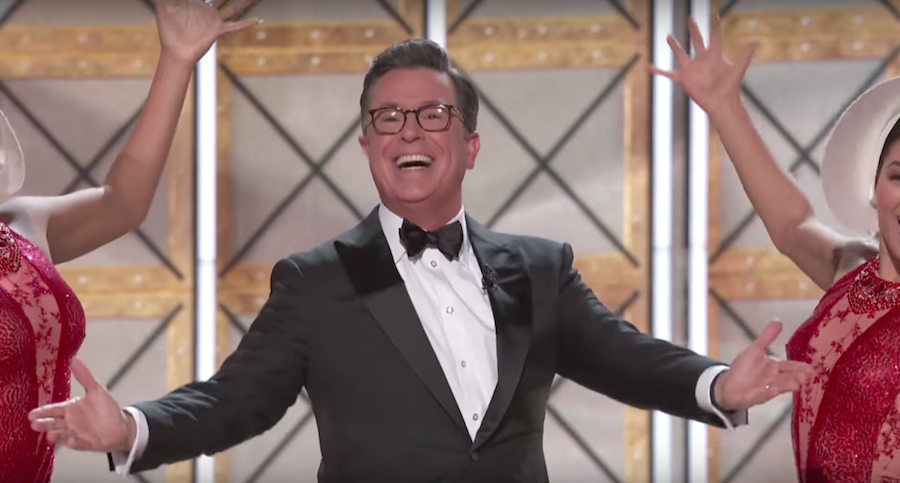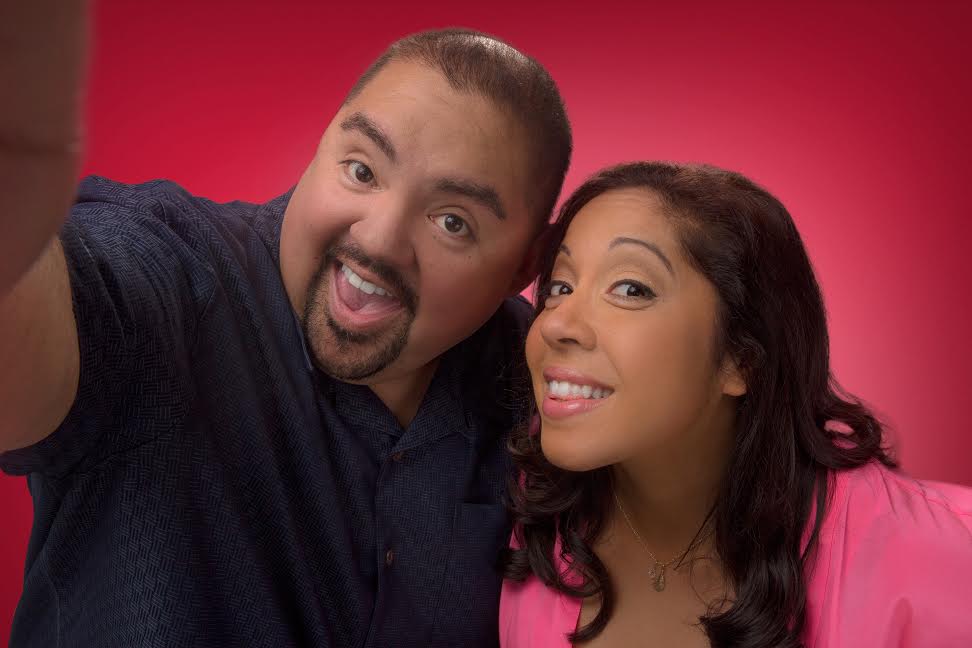Kevin McDonald is a solo act in 2013, but the Kids in the Hall comedian isn’t alone. McDonald is touring North America, teaching aspiring comedians how to write their own sketches, and also sometimes performing alongside them in improv theaters.
McDonald spoke backstage with The Comic’s Comic at The PIT in New York City earlier this month before a gig in which he was to do stand-up first, followed by improvised scenes with The PIT’s founding owner Ali Farahnakian and other performers.
How is your current tour different even from the Two Kids One Hall run you had with Scott McDonald?
“It’s sort of a non-tour tour. I’m performing sometimes, and I’m teaching workshops sometimes, and sometimes I’m teaching workshops and performing, like this weekend (Feb. 2-3). It’s different, in that it doesn’t seem like a tour. There’s less structure to it. I go out like twice a week. I guess it’s exactly the same as a tour but it doesn’t seem like a tour because I’m not going with Scott.”
“With this it just seems like, I’m going on a trip. It’s a great city. And I go, ‘Oh, yeah. I also have to work.”
Does it feel more like work when you’re by yourself doing stand-up?
“Yeah, it’s a lonely thing to do stand-up. Especially when you’re really a sketch comic, and you’re like faking that you’re doing stand-up comedy. And also, the improv makes me nervous. Very nervous. I’ll have to have a drink before I do it. And stand-up makes me nervous, because I’m alone. Performing with Kids in the Hall does not make me nervous. But stand-up makes me nervous because I’m alone. And improv makes me nervous, because there’s no script. So I have to be on. People expect me to be funny, because they’ve seen me be funny on TV. And I feel that. I feel that pressure. Nothing makes me less funny than knowing that people expect me to be funny. So, yeah. The whole thing feels different that way. It’s lonely when you’ve spent your whole life with a troupe of five people, and suddenly be there by yourself. It’s a lonely feeling, but it’s an amazing job. And I’m lucky I have it.”
When you’re doing these workshops, like you did previously in San Francisco for SF Sketchfest, what’s the first thing you try to impress upon the people in your workshop, who are looking to you for answers?
“It’s funny. About me feeling pressure. I also feel pressure, when as soon as the workshop starts and they pull out their pen and paper, and they’re ready to write down notes. And the workshop is almost like an improv. Like, I don’t know right away what great stuff to tell them — I see their scenes in improv, and I give notes as they go along. It’s two long days, the workshop. So the pressure usually eases down, and I find that by hour three, I’m saying things that they’re writing down. But, what was your original question? I’m sorry.”
What do you try to impress upon these people who are coming to you, seeking this guidance? Do you lower their expectations, then?
“I lower the bar (chuckles). No, I don’t know what I’m trying to impress upon them. If there’s a general theme or a point of view that I have — I know that I have one. But I don’t know what it is. If I knew what it was, I’d probably ruin it, because I’d be thinking about it too much. In my mind, I’m trying just to get them to write sketches through improvisation. And all of the other things that I’m thinking of, I’m not really trying not to think of it. And then, along the way, certain theories that I have about comedy come to me, and I say them. Then I realize, that’s the sneaky reason that I’m doing the workshop. Because I’ve got all of these boring comedy theories that I’ve bored, either on the Kids in the Hall tour bus or at real people at parties, and I get to say them. And people, because they’ve paid for the workshop, they want to hear it. It’s getting a million theories across to them, and maybe hopefully the theories add up to a bigger worldview of sketch comedy.”
Do you have a favorite or a go-to theory of comedy?
“Yeah. My go-to is that my favorite kind of comedy is a comedy with a point of view.”
“I always say that the two sketch shows that came after Kids in the Hall, Mr. Show and Chappelle’s Show, they were both great shows. But if I were stuck on a deserted island, and I had to only pick one, I would pick Chappelle’s Show, because it had a point of view. And Mr. Show was really really funny, very very clever. And clever is great and hard to do. Either you’re clever or not. But I don’t know anything about what David Cross or Bob Odenkirk thought about life — but with Dave Chappelle, I totally knew. Whether I agreed or disagreed, I totally got his point of view. I understood the way that he saw the world a little more, and I laughed a lot. That’s important. You have to laugh a lot. I understood the way that he saw the world a little more, and in a way, it informed my worldview, either by agreeing or disagreeing, or agreeing so much that it could add to my point of view. I think Kids in the Hall had a point of view. I would be hard-pressed to explain what that is. Something to with kids who had drunk dads, that grew up in the suburbs, and moving to the big city and being lousy at relationships. Something. I’m having trouble explaining it. And that’s probably my go-to theory. Which seems pretty sad, for a comedy theory.”
How did you guys in Kids in the Hall all find each other?
“Dave (Foley) and I were teenagers, and we found each other at a Second City workshop. We were doing the mirror exercise together. By the end of the mirror exercise, we were laughing — we were in the fetal position, laughing. At the end of the class, we were all split up into groups, and he was like the funniest guy in the class. You could tell. I had seen other funny people in the class, but I could tell there was a chemistry. So I asked him to join my troupe. I didn’t have a troupe.
“Dave and I were in a group with another guy, Luciano Casimiri. Who’s a very big writer up in Canada. We’d always heard about these guys from TheatreSports out in Calgary, called The Audience. They were just like us. They finally moved to Toronto and we merged with them. We were a troupe with lots of people in it. People kept quitting until there were just four of us. And two of the guys were from The Audience, Mark McKinney and Bruce McCulloch, and then Dave and I. There were four of us, and for some reason, Mark thought we needed a fifth guy, and thought we needed a gay actor, so we decided on Scott Thompson!”
Is that the secret to creating a successful and cohesive sketch group, start organically and find like minds?
“I guess the best way may be organically. We had chemistry. There were a lot of guys — we had like 10, 11, 12, 13 of us — there were a lot of guys who, some you could argue, were funnier individuals than any of the Kids in the Hall. Like Gary Campbell and Frank Van Keeken. But the chemistry wasn’t there until it was just Mark, Bruce, Dave and I. And it was organic. We were friends first. We would see movies together. There was no audition. It’s like, to choose a hockey analogy, because I’m Canadian, in the ’80s, they always said, who would be better to play the Russians: An all-star team of NHL players, or the Edmonton Oilers, that were a perfect team? Obviously, it was the Edmonton Oilers.”
Well, they had “The Great One.”
“They had Gretzky, they had so many…That’s what happened with Kids in the Hall, we became an organic team that was like a best-of. I always say this about Kids in the Hall. We’re not the five funniest people in the world, but we may be the five funniest people that work together.
“Only because Monty Python quit. Otherwise it’d be them.”
You mentioned Mr. Show and Chappelle’s Show. Do you watch any of the new sketch shows out now like Key and Peele or Kroll Show?
“Yeah, yeah, yeah. I like that. And I guess it’s not new anymore, but Human Giant I liked. And the Whitest Kids U Know, I liked that. Do they still have a show?”
No. But Key and Peele have a show on Comedy Central.
“Oh, yeah! That’s a great show.”
Nick Kroll has a brand-new one called Kroll Show.
“I haven’t seen that, but I’m sure it’s good.”
And then on IFC, there’s Portlandia.
“I love that. I love that. I love Fred. I think he’s a low-key genius. Sort of reminds me of Luciano. The original Kid in the Hall with Dave Foley and I.”
All of those, though, aren’t sketch groups, per se. They’re duos or one person fueling it.
“Yeah, it’s really hard to, I think an organic sketch troupe, is, there haven’t been that many. Even Monty Python wasn’t really organic. They knew each other, and they were teams. Michael Palin and Terry Jones were a team. And Cleese and Chapman were a team. And Eric Idle was by himself. And some producer said you know each other, you went to university together, you and you and him should work together. Even though they knew each other, it wasn’t organic. It’s such a rare thing. Most sketch groups…I guess a lot of them are organic, but they usually don’t stick together long enough. Even Human Giant, they got a TV show, and they were pretty much conquered and divided pretty quickly. I think that’s what happens with sketch groups. That’s what they’re there for. They’re conquered and divided. Some get writing jobs. Some get acting jobs. Aziz Ansari got an acting job….that’s the normal thing that happens with a comedy troupe. With Kids in the Hall was like very rare, I would say.”
Well, we’re all the happier for it.
“Thank you very much.”




Kevin McDonald talking about Sketch Comedy at the National Comedy Theatre https://valleyhype.com/kevin-mcdonald-national-comedy-theatre/